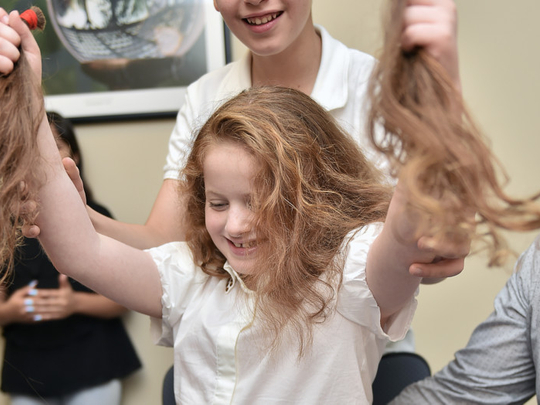
Dubai: Little Kimia is seven years old. She is always happy, ever-smiling and extremely sociable. Nothing wrong with that, except that doctors say her exuberance is the result of a genetic disorder called Angelman Syndrome (AS).
A very rare medical condition, Angelman Syndrome is not something most other kids, even adults, in the UAE are aware of.
Kimia’s mom Souzie Mackay says she knows only four other cases like her daughter in the emirates.
But she is determined to raise greater awareness about the condition to mark Angelman Syndrome Day on February 15. Not just that, in a gesture that is sure to touch many hearts, Kimia, who has long, beautiful hair, generously agreed to donate 12 inches of her golden locks to make wigs for children with cancer. As her mother did the needful in an exclusive launch of the campaign at the XPRESS office, she watched in fascination, the big smile never leaving her face.
Happy Puppet
Known as the Happy Baby or Happy Puppet Syndrome, AS is a chromosome disorder which causes acute learning difficulties besides issues with speech, movement and coordination. There is no known cause or cure. “Kimia is vocal but non-verbal. She can comprehend things around her but can’t quite express her feelings,” says her dad John Mackay.
A pilot who has been in Dubai for 10 years, John recalls how Kimia was slow on the uptake as a baby. “Souzie had a normal pregnancy and Kimia is our second child. But by the time she was one, we realised there was something missing. When doctors diagnosed her with AS, it was a crushing discovery for us. But now, we feel so differently. We understand kids with AS are special with needs and feelings like other children,” he says.
Regular school
Kimia, who is set to be enrolled into Year 2, can go to regular school. Affable and hyperactive, she is constantly looking to play with other children. But it can be a challenge at times as she can’t express her feelings. Kimia’s parents say her confidence takes a beating if she doesn’t feel welcome. “Everybody knows about disorders like autism and dyslexia. But few have any idea about AS,” says John.
“Children who have this condition love to play and be around others. They learn by watching others. It is important that all children and adults learn to be inclusive and accepting of everyone. We are all different and that’s the beauty of life. Communication is key no matter what. People should feel comfortable to ask questions and approach us, rather than judge,” says Souzie.
But Kimia is blessed to have a loving family and a circle of friends who are supportive. “When she walked in to our class in Year 1, our teacher told us about her problem. The best thing I like about her is that she is kind and helpful,” says one of her friends Sephora. Kimia’s elder brother Alec too understands her well. “I love my sister. She’s always happy and creates an atmosphere that makes us all smile.”










